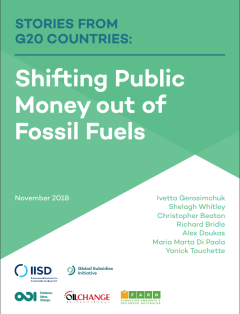
Energy subsidies and tax revenues, investments by state-owned enterprises (SOEs), and credit support through state-owned banks and international finance institutions represent flows of public money that can either undermine or encourage sustainable and equitable development and decarbonisation. Despite commitments by the Group of 20 (G20) governments to end government support to fossil fuels through a number of reform pledges, they continue to subsidise and support the production and consumption of oil, gas, coal, and fossil-fuel-based electricity. Political inertia, vested interests of the industry, and a lack of transparency and accountability all lead to the continued use of taxpayers’ money to lock in unsustainable development pathways.
Yet, change is possible. Some G20 governments have made progress in shifting at least some support away from fossil fuels and increasing taxation of fossil fuels. This working paper brings together examples illustrating how reforms can be enabled and implemented to align the flows of public money with the Paris Agreement and Sustainable Development Goals (SDGs).
